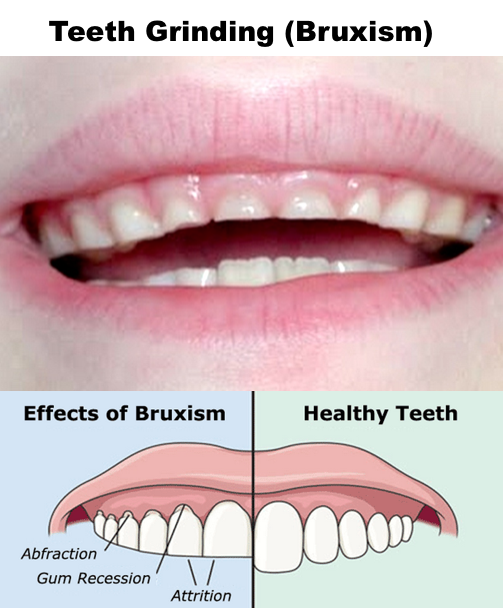We all get stressed out once in a while. And when we do, our mental stress can actually create physical symptoms. For example, when some people feel anxious and tense, they grind or clench their teeth. It can happen during the day or at night — and you might not even know it. But either way, it’s a very real problem that doctors and dentists call bruxism.
Bruxism teeth grinding may be mild enough to be completely unnoticeable. However, it can be severe enough to lead to jaw disorders, headaches, damaged teeth and other dental problems.
The most common form of bruxism teeth grinding is sleep bruxism. Because you can grind your teeth at night and not even know it until complications develop, it’s important to learn the warning signs and to seek routine dental care. Bruxism treatment may be as simple as practicing self-help steps to reduce stress or may require you to wear a bruxism guard when you sleep.
Warning Signs of Bruxism Teeth Grinding
Grinding your teeth puts pressure on the mouth’s muscles and tissues, as well as the jaw. If you wake up with a sensitive jaw or if it hurts to eat, you might suffer from sleep bruxism. Here are some warning signs to watch out for:
- Grinding that is loud enough to awaken your sleeping partner
- Increased tooth sensitivity
- Sore, painful jaw
- Headache
- Earache
- Chronic facial pain
- Teeth that are worn down, flattened or chipped
If you routinely experience one or more of these problems, talk to your dentist about bruxism treatment.
The Bruxism Treatment Grind
There are a few different dental approaches to bruxism treatment. The first is a bruxism mouth guard. These are available over the counter or your dentist can make a custom bruxism guard called a night guard specially designed to fit your mouth. An over-the-counter bruxism mouth guard might be less expensive than a custom fitted bruxism guard, but tends not to fit as well.
Another dental appliance used for bruxism treatment is called a splint. This type of bruxism guard is a custom-made piece of hard plastic that fits over your top or bottom teeth. Several types of splints are available. One popular type of bruxism mouth guard is called an NTI appliance. This bruxism guard fits over just the front teeth to prevent clenching of the back molars.
If your bruxism teeth grinding is linked to a problem with your bite, an orthodontist can help correct the malocclusion. Dental braces may be needed to straighten your teeth. In severe cases, when tooth wear has become so extreme that it’s hard for you to chew, a dentist may need to perform several corrective procedures. In these cases, bruxism treatment may involve dental onlays or a dental crown to repair one or more affected teeth.
Getting Care for Bruxism Teeth Grinding
If you wake up with an unusual amount of pain in your mouth, try some self-help basics to relax. Start by trying to relax your facial muscles; you might even practice some simple relaxation techniques.
If the pain persists, you might benefit from a custom-fitted bruxism mouth guard.

